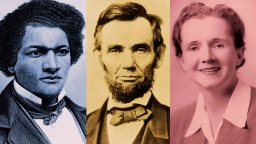“We are not enemies”: How to master the rhetorical genius of Abraham Lincoln

- The framers of the U.S. Constitution were deeply immersed in the traditions of classical rhetoric.
- A sharp provincial lawyer, Lincoln hitched classical oratory to a crisply vernacular style.
- In his most memorable speeches, Lincoln was plain and straightforward in a wry and friendly way.
The 16th President of the United States of America did not, as you might imagine, speak in a rich chocolaty baritone. He had a high, squeaky voice and a strong Kentucky accent. Nor — coming from a humble background — could he automatically be expected to have a confident grasp of classical rhetoric. That would have mattered. We may think of the American Revolution as a bold and unprecedented new beginning, the casting off of a European yoke, but it would be hard to overstate quite how deeply immersed in the traditions of classical rhetoric the framers of the U.S. Constitution and their inheritors were. Every town in Massachusetts had a grammar school, and from the age of eight, pupils there would be taught the classics from eight in the morning until dark fell. Candidates for higher education would be expected to have tracts of Cicero, Virgil, Isocrates, and Homer by heart.
Samuel Adams’ master’s thesis was “delivered in flawless Latin,” Alexander Hamilton copied Demosthenes into his commonplace book, and Thomas Jefferson modeled his oratory on the prose of Livy, Sallust, and Tacitus. John Adams spent the summer before he became president reading Cicero’s essays. Pamphlets and articles were written under classical pseudonyms — Samuel Adams alone was, inter alia, “Clericus Americanus,” “Candidus,” and “Sincerus.” Displaying classical knowledge was a way of demonstrating education and sophistication — it was, if you like, an ethos appeal in itself.
Rome was more than just a literary touchstone: England, in the narrative of the Revolutionary War, was cast as the bloated and corrupt Roman Empire of late antiquity, whereas the founders saw themselves as harking back to the virtues of the Republic. They sought visible symbols of this. Thomas Jefferson built the University of Virginia on strict classical lines, and when the Capitol was to be built in Washington, he insisted that its architecture should see “the adoption of some one of the models of antiquity which have had the approbation of thousands of years.”
When George Washington was called “the Father of the Country,” that was an echo of what Cato said of Cicero; and Cincinnatus — a plowman who led Rome as dictator but then relinquished his power to return to the fields — was frequently invoked as a spiritual cousin to Washington.
So this was the soil out of which, a generation later, Lincoln’s rhetoric was to grow. But as the largely self-educated son of a Kentucky farmer, he wasn’t able to tap into the knowingly arcane byways of classical history with which his predecessors were able to signal their patrician credentials. Lincoln was a clever, gangly, pugnacious, provincial lawyer.
His special distinction as a speaker was not to deliver the fullbore, self-consciously Greco-Roman ornamentation of his predecessors. It was to tame those techniques — to yoke classical figures to a crisply vernacular style, and to offset his intermittent stylistic flourishes with a folksy swoop down to a register where he all but claps the individual audience member on the shoulder.
In the “House Divided” speech, with which Lincoln accepted the Illinois Republican Party’s nomination to run for the Senate, Lincoln talks the audience through the history of the argument so far — could the union make sense with some states countenancing slavery and others free? — in an absolutely plain and straightforward way, wryly dramatizing it as you might dramatize an argument between friends. “Then opened the roar of loose declaration in favor of ‘Squatter Sovereignty’… ‘But,’ said opposition members, ‘let us be more specific’… The election came, Mr. Buchanan was elected, and the endorsement, such as it was, was secured… At length, a squabble springs up…”
His special distinction as a speaker was not to deliver the fullbore, self-consciously Greco-Roman ornamentation of his predecessors. It was to tame those techniques.
Seeking to avert civil war, in his First Inaugural Address, Lincoln spoke in the same way — reasonable-sounding and without pomp: “I add too, that all the protection which, consistently with the Constitution and the laws, can be given, will be cheerfully given to all the States when lawfully demanded, for whatever cause — as cheerfully to one section as to another.” Note the studied impression of a mind at work: the sense of “and another thing,” the naturalness of the qualifying parentheses, and the amiable excellence of “cheerfully” — yet all in a sentence whose clauses build and interlock artfully in both sound and sense, moving from “laws” to “lawfully,” “all” to “all,” “given” to “given,” “cheerfully” to “cheerfully.”
The peroration to that same speech is not blood and thunder, but an antithesis so intimate in tone — charged with such feeling — its effect is still startling: “I am loath to close. We are not enemies, but friends. We must not be enemies.”





